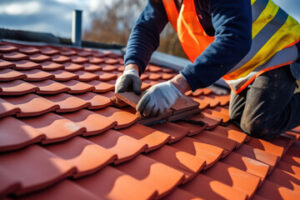A roof protects your home from the elements and can help maintain its value. But the process of installing a new roof or replacing an old one is complex.

You can expect the roofing team to take many safety precautions and use powerful tools like air compressor nail guns, ladders, hammers, and shingles cutters. These tools require proper training and handling to prevent injuries. Visit https://www.northportflroofing.com to learn more.
A roof is one of the most important parts of a home or building. It protects it from weather and other elements, increases energy efficiency, and enhances the curb appeal. It is crucial to maintain and repair a roof as needed. However, roofing installation is a labor-intensive process that requires a high level of knowledge and expertise. Thankfully, there are ways to prepare for a roofing project that ensures the job goes smoothly.
First, clear your yard of toys, bikes, and other items. This is a safety precaution to prevent kids or pets from being injured by falling debris. It is also a convenience for the roofers, who may need to move or clean items out of the way as they work.
Make sure you have an accessible power outlet available for the roofers to use. This is helpful for keeping them powered and can help eliminate downtime while they wait to charge their tools. Clearly marking or showing where these outlets are located can make it easier for them to find them as well.
If you have a garden or flower beds near your house, consider covering them with tarps or placing netting over them during the roofing project. The vibrations created by hammering and sawing can cause plants to become dislodged or damaged. Marking or staking any particularly delicate or expensive plants can help the roofers give them a wide berth.
Lastly, check for electrical wires running through the rafters of your roof. These wires can be dangerous if they are pierced by fasteners or nails. If you have any in-ground electric wires, it’s best to have them professionally removed by a licensed electrician before the roofers start working.
Lastly, notify your neighbors that you will be having roofing work done. This will prevent them from parking in front of your home or blocking access to it. It’s also a good idea to let them know about any noise and traffic congestion that might be caused by the project. Finally, if you have children, it is a good idea to have them stay at Grandma’s or with friends during the roofing project. This will prevent them from getting bored or distracted by the activity and may protect them from the potential dangers of tripping over roofing equipment and materials.
Installation
Installing a new roof or replacing an existing one is a meticulous process that requires specialized knowledge and skills. Professional roofing contractors have the experience, equipment and materials required to ensure a high-quality roof that will protect your home or commercial structure for years to come.
During the installation process, the roofer will cover any plants or structures beneath the shingle area with plastic sheeting to prevent damage. Then they will place the first row of shingles, nailing close to the edge and spreading out as they go along the underlayment.
The roofer will also add any vents, ridge vents and roofing pipes that are necessary for the safety of your home or business. Then, they will seal them with a large bead of roofing cement.
Inspection
Once the shingle installation is complete, the roofers will perform a thorough inspection of the work and clean up. This includes removing all nails, remnants of materials and old roofing from the site. The inspection also checks for areas where water might enter the home, such as loose shingles or cracked mastic around vents and chimneys.
If the roof sheathing is in poor condition, it may be necessary to replace it before moving forward with the reroofing project. The roofers will evaluate the existing decking to make sure it is in good shape and can support the new shingles.
After the roof is inspected, high-quality flashing will be installed over any joints to prevent leakage. This includes the drip edge, as well as the flashing surrounding the roof’s valleys, vents and chimney. If the existing flashing is damaged or missing, it will be replaced with a durable aluminum or galvanized steel product that will keep water out of the home for years to come.
In addition to inspecting the roof, the roofers will also look at the eaves, valleys and trim for damage or wear. This is an important step because it ensures that all elements of the roofing system will work together to defend against the weather and maintain energy efficiency. The roofers will also inspect the gutters for any clogs or water damage. Lastly, the roofers will make sure that all of the roof penetrations are properly sealed. This includes sewer vents, ridge vents and vents for kitchens and bathrooms.
